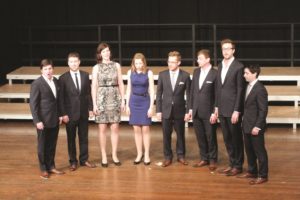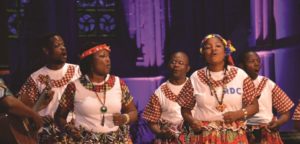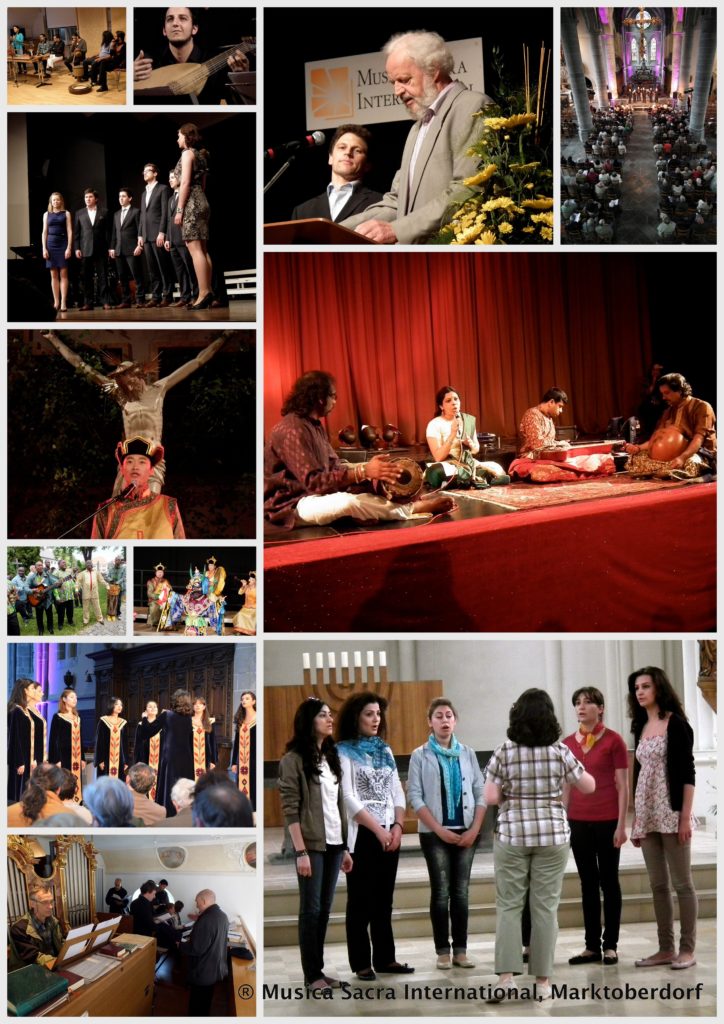A Musical Window on the Religions of the World
The International Musica Sacra Festival 2012 in Marktoberdorf, Germany
Walter Vorwerk
music reporter
“Let everything that hath breath praise the Lord.” So ends Johann Sebastian Bach’s motet, Singet dem Herrn ein neues Lied (Sing to the Lord a New Song; BWV 225), marvelously performed by the famous London vocal ensemble, VOCES8, during the ‘International Musica Sacra Festival’ in Bavaria’s Marktoberdorf. One marvels at the motet’s wonderful sounds, but one may also reflect on what they express musically, for the reference to God here is bound to no one particular religion: Let everything that hath breath praise the Lord.

The vision of Dolf Rabus, founder and director of Modfestivals international choral events (alternating every other year between ‘Musica Sacra’ and the ‘International Chamber Choir Competition’) here bears fruit: making the world more peaceful, above all in the drawing together of world religions through their musical modes of expression. It all began twenty years ago as a small shoot was tended in Roman Catholic Bavaria: representatives of the world religions were invited to a music festival. There were many hurdles to overcome; not just financial ones, but above all, barriers erected in people’s heads in the form of calcified doctrines. One can still hear it said in Bavaria, and not only there: “Other religions have no business in our places of worship.” As if one had gained possession of God. But, there are other people in the world, from other religions, who ‘have breath’ and, in their own ways, ‘praise the Lord.’ Recognizing that fact, accepting and proclaiming it, is a rocky road to travel, one at which the organizers of ‘Musica Sacra International’ do not balk. And so, from May 25th-30th, to the eleventh festival in the regional township at the foot of the Alps came fourteen ensembles with musicians from fourteen countries: Argentina, Armenia, Egypt, Germany, France, Great Britain, India, Iraq, Iran, Israel, Democratic Republic of the Congo, Mongolia, Russia, and Sweden. That list alone makes it clear that here Christians, Muslims, Jews, Buddhists and Hindus met together. And this meeting took place in multiple ways, in churches, halls, mosques and synagogues. Every group – the Via Nova choir from Munich; the Indian musician, Shantala Subramanyam, with her group, Dakshin; the Mongolian Buddhist dance and instrumental group, Khuree Tsam (with, among others, their fascinating overtone performance); the Iranian musician, Maryam Akhondy, who lives in Germany, with her ensemble, Barbad; the eight women from the Armenian St. Geghard Cloister; the Israeli Moran Singers, accompanied by Iraqi Jewish musician, Yair Dalal; the spirited Choeur la Grace from the Congo; and the Grupo de Canto Coral from Buenos Aires – these, and all the musicians involved, inspired audiences with their spirituality, ultimately generating a feeling of fellowship. All the conversations to which I have been privy agree as to the inestimable worth of the ‘International Musica Sacra Festival’. Take, for instance, Néstor Enrique Andrenacci, the Christian founder and leader of the Grupo de Canto Coral from Buenos Aires: “For me, Marktoberdorf is above all a place of encounter for groups of the highest musicianship, a place for exchange and mutual learning. My fellow choir members see it likewise. They are very moved by the way in which people of other cultures and religions meet and gain understanding of each other here. I am happy that ‘Musica Sacra’ will be coming this year from Marktoberdorf to San Juan, to lend support to our efforts on behalf of tolerance and mutual understanding.”

Two years ago, a mosque – an Islamic Turkish cultural centre – was opened in Marktoberdorf. Its imam, Ismail Şenkul, immediately decided to host a ‘Musica Sacra’ concert of a special nature in his place of worship. In the prayer room, Muslims, Jews and Hindus made music together. It was an emotional high point the musicians and visitors will never forget. Before the concert, the imam said to me: “This is a wonderful opportunity for dialogue, which is so essential for us. We all come from the same Creator, who gives us the chance to learn to live together here on Earth. Our prophet Mohammed lived together with Jews and Christians during his time in Medina; even today, he gives us an example of how we should and can live together in mutual tolerance and respect, no matter what religion one ascribes to. So, our mosque is an open house, in which we respect other people’s prayers, too.”
During the concert, the Jewish choir director, Naomi Faran, led an ode to peace in Arabic. All the participants, including visitors, joined in singing it. Afterward, deeply moved, she made a gift of her Musica Sacra light as a sign of peace and mutual understanding to Aykan Inanς, the representative of the Islamic-Turkish Community of South Bavaria. Naomi Faran: “I regard it as a privilege to sing and play instruments in this place.” The imam concluded his remarks to me by saying that the concert had made him very happy. We too, of course. “Here, at ‘Musica Sacra’, this is the place where one can live one’s faith and contribute with music to mutual understanding and the peace process.”
The Indian musician, Shantala Subramanyam, sits cross-legged on a rug, flute in hand and surrounded by percussionists, beside the singer, Parthasarathy Ganesh. During the singing of ragas, the motions of her hand underscore the notes’ movements as she beats her foot along with the rhythm. The notes rise and fall through the room. Shantala is the name of the reincarnated Parvati, wife of the god, Shiva. It means, ‘She who stands under the sign of peace.’ “Music is spirituality for me,” she says. “For me, it doesn’t matter who is making music, whether they be Jewish, Christian or Muslim: spirituality unites us. The way to serve God with music remains the same among different traditions, arrangements or elaborations. Music is the best means to overcome barriers. Music is my prayer. This is my first time in Marktoberdorf, and I sense here that the basis for our mutual understanding is tolerance, attentiveness and mutual respect. This valuable, beautiful project inspires me. I find it very touching, as a Hindu, to find myself in an Islamic mosque. I am not nervous or anxious, because, you know, God is everywhere.”
Her remarks found confirmation in an evening concert at the Augsburg synagogue given by Orthodox Christians from Russia, along with the Moran Singers from Israel and the Islamic group, Fawzy al Aiedy, from France.
By way of Constantinople, Christianity came long ago to the Caucasus region and to Armenia. There, the cultures of East and West met, including the culture of song, especially notable in the liturgical singing found in cloisters. In their homeland, in the Armenian cloister of St. Geghard, a women’s octet sings under the direction of Anahit Papayan. ‘Musica Sacra’ inspires her. “It’s wonderful, what is happening here: a festival of music and peace. Truly, this is a little model of universal peace. Music, which knows no borders, reaches hearts; it binds together, it doesn’t divide. Here, one senses that. That is what makes this festival so beautiful.”
This visionary experience also moves the exiled Iranian, Maryam Akhondy, who came to ‘Musica Sacra’ with her ensemble, Barbad, to demonstrate the music of Persian Islam. She could not do that in Iran: it is forbidden to women, which is one of the reasons she left her homeland in 1986. “Music is my God. Why should I hide Him from others?” she said proudly and with confidence. “God belongs to all, and I am happy that I can share this spirituality with others. Music takes hold of us all: We dance, we sing, we become one. Here, I live in peace with myself and with others. That is a wonderful feeling.”
Which is exactly the experience of Florian Helgath, the young director of the Via Nova choir Munich: “I have heard music here that was entirely unknown to me. There are certain experiences, not just musical ones, that inspire. It’s not just a joy to be able to sing here, but also to have the feeling that one is a part of this international spiritual community. One feels suddenly this common denominator – the yearning for inner and outer peace.”

That common denominator depends upon every careful contribution, something still felt strongly by Dolf Rabus, festival founder and director (Vice-President of the Consortium of German Choral Associations, the producers of ‘Musica Sacra’): “It is important to me that the ideas associated with ‘Musica Sacra’ be more widely diffused.” So, ‘Musica Sacra’ is going on tour: to Belgium, France, in Rheinland-Pfalz, and as previously noted, to Argentina in November. This wider diffusion has another target, too: young people. One ongoing project of ‘Musica Sacra’ is ‘Tolerance sets a precedent’. The festival values of mutual understanding and respectful tolerance are being taken into schools by means of films, guest presenters and organized discussions. “Young people are our future. The values of practicing tolerance, as we live them at ‘Musica Sacra’, must be cultivated and deepened in education both at home and in schools. We are taking an important step with this project.” Here, one might describe many moving moments of encounter, marvellous concerts, impressive worship services and lectures. The patron of ‘International Musica Sacra’, retired bishop of Lübeck Bärbel Wartenberg-Potter, spoke from a full heart to the many participants gathered at Trinity Church in Kaufbeuren for the evening-long finale, during which she remarked, “Religions are the different dialects of the One God. God has sent us messengers at different times, but with similar messages: Moses, Jesus, the Buddha, Mohammed – all God-communicators. Today more than ever, the duty of religions in the globalized world is to secure peace: shalom, salaam, Frieden. Religions must not be misused for oppression, for marginalization, for division and hate. ‘Musica Sacra’ is a beautiful instrument of the Holy Spirit. So: Sing without fear, ye churches, synagogues and mosques! Sing to the glory of God of the yearning for peace and justice, sing in your dialects, in your religious tonalities! Sing the holy! Sing for life!”
Walter Vorwerk, walter.vorwerk@gmx.de
Translated from the German by Marvin Vann, USA
Edited by Gillian Forlivesi Heywood, Italy